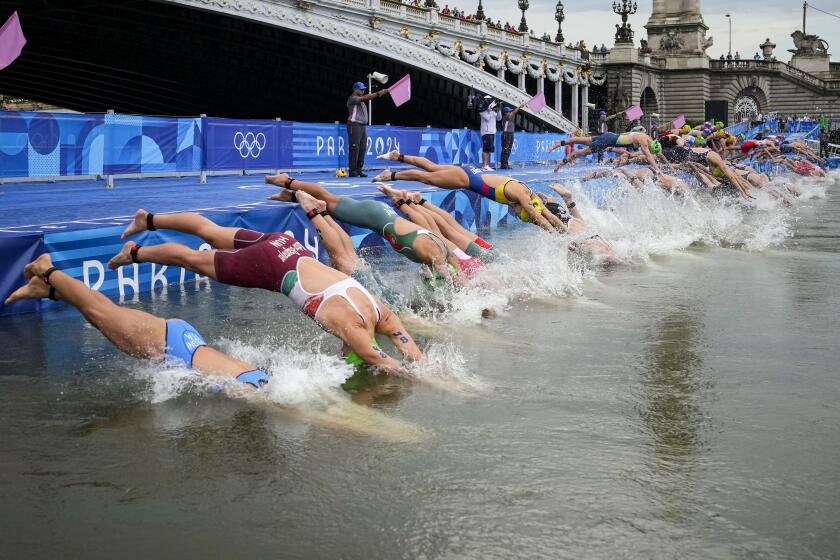Beatings Added Agony to Defeat
During his years as Iraq’s reigning soccer superstar, Ahmed Radi felt a hard knot of dread in his stomach whenever he prepared to take a penalty kick. For him and other players, the very term carried a sinister overlay of meaning.
Radi wasn’t just worried that he’d let down his fans and disappoint his teammates if he missed.
He also feared being jailed and beaten -- punishments that for years were routinely doled out to Iraq’s top athletes for perceived transgressions on the playing field.
The systematic abuse of hundreds of Iraqi athletes -- wrestlers and basketball players, soccer stars and kick-boxers, volleyball players and bicyclists -- came on the orders of Saddam Hussein’s son Uday, who was chairman of the country’s Olympic Committee and oversaw Iraq’s national teams in every sport.
Now, at training sessions in ragtag Baghdad gyms and at scrimmages on dusty, disused fields, athletes are beginning, hesitantly, to relate stories of their fear-filled years in the bizarre orbit of Uday.
They paint a portrait of a man obsessed with perfection in athletic endeavors in which trying and failing is a natural part of the game, of an insecure hanger-on who was wildly jealous of the popularity and achievements of the athletes under his power, constantly concocting new punishments for them while at the same time craving their esteem and approval.
“I can put it simply -- to me, Uday was not a human being,” said Amer Abdul Wahad, a member of the national basketball team from 1993 to 1996. “He was empty of all human feeling.”
“Sometimes we thought death would be better than the treatment we received,” said Mohammed Tahar, a former wrestler on the national team who is now one of its coaches. “We were scared, just so scared all the time.”
Even the most celebrated athletes were not immune from maltreatment. They were sometimes singled out as targets.
Radi, a two-time Olympian who retired in 1997 and is now a coach of the national team, is still an idol in this soccer-crazy country.
At 39, he’s a Middle Eastern version of British soccer hero David Beckham. Everywhere he goes, fans recognize him -- in the market, in the street, driving on the highway.
“They honk at me, they wave, they smile and smile when they see me,” Radi, a pale and clean-shaven father of three daughters, said a little sheepishly.
The adulation he received on and off the field, he said, was a dizzying contrast to the tribulations he and his teammates suffered if their performance was not to Uday’s liking.
“We couldn’t play properly sometimes, thinking about what would happen to us if we failed,” he recalled in an interview in his Baghdad home, filled with trophies and picture scrapbooks of his career.
After losing an important match, he said, the entire team was sometimes transported directly from Baghdad’s main soccer stadium to jail in a bus with blacked-out windows, the players not knowing how long they would be incarcerated.
Sometimes they would be confined in a single cell, sometimes held separately, and sometimes subjected to a military-style training regimen in which they were beaten with sticks, he said.
“It was normal to spend days and weeks in jail,” said Laith Hussein, the current captain of the national soccer team. “We would joke that we had three homes -- our own houses, the stadium and jail.” Players said Uday would keep painstaking statistics on how many errors each of them had made during the match, which would calibrate accordingly the length of a player’s sentence and the beatings to be administered.
Radi recalled a match in which he made six errors, and Uday ordered afterward that he be beaten with a cane six times on the soles of his feet.
“But the guards at the jail were fans of mine, and when they took me into the room for my beating, they told me to shout out as if in pain while they made a sound like flogging,” he said. “For the final blow, the sixth, they apologized and said they had to really hit me, in case Uday checked for marks on my feet. They were very afraid he would punish them if he didn’t find any.”
Players said Uday’s impossible demands left them unable concentrate on the competition at hand.
“Once before a tournament, he made us all sign a paper promising that we would win a medal,” said Abdul Wahad, the basketball player. “Naturally, we could only think of that and not our games, and we lost. And were punished.”
Athletes said they lived in fear of Uday and his entourage, even if they were performing at the top of their game.
Last year, the coach of the youth kick-boxing team angered Uday by refusing to allow his Fedayeen militia to participate in the team’s workouts. All the team’s tournament engagements immediately were canceled.
Soon afterward, a member of the team, Diaa Hussein, had the misfortune to encounter a top Uday aide, who knocked him unconscious with a blow to the head.
“I remember him saying to me first, ‘Here, show this to that coach of yours!’ ” said Hussein, fingering the indentation left by the blow above his right eye.
Abdul Wahad described the deference with which players were expected to treat Uday -- or suffer the consequences.
“Once, he came into the gym -- we’d been practicing very hard and were resting, some of us with our heads between our legs,” he said. “Whenever we saw him, we were supposed to stand up instantly and shout, ‘Salaam aleikum!’ [“Peace be upon you!”] to him. But no one noticed him right away.” Furious, Uday berated the teammates, screaming at them that they were dogs and monkeys -- a grievous insult in the Arab world. Then he canceled their scheduled trip to a tournament in Tunisia.
“It was a dream to travel outside Iraq, so it was a bitter blow,” Abdul Wahad recalled. “But actually, we felt we were quite lucky -- we all expected to be put in jail for that. We had all been jailed many times for so much less.”
Even athletes who escaped punishment themselves said they lived in a state of constant terror, as tales of abuse were circulated furtively in their training clubs.
“I would hear the stories from the others, and wonder, ‘Will it happen next to me?’ ” said Imad Hussein, the reigning Iraqi national boxing champion in his weight class. “You would think about it all the time. Fortunately for me, he didn’t care so much about my sport. I think that is all that saved me.”
Because of the climate of fear, Hussein, like many others, was afraid to complain about the lack of any financial subsidy for his training. For the last five years, he has worked in an ice cream shop to support himself.
Untreated injuries -- some suffered in competition, some in jailhouse beatings -- plague many of the athletes. Most said they could not afford to pay for medical care themselves and risked punishment if they asked to see a doctor.
“They burned me out like a candle,” said Tahar, the wrestler, who still retains the powerful build of his days of competition but hobbles because of torn cartilage in his knee. “I can’t read and write, so the sport is my only life.”
A few players, including top soccer stars such as Radi, sometimes played on a contract basis for teams elsewhere in the region, in Qatar or Lebanon -- with lucrative kickbacks going to Uday. But family ties, coupled with a sense of national pride, brought them back to Iraq, even knowing more maltreatment awaited them.
It was easy to provoke Uday’s jealousy. Radi said he once returned from a stint in Kuwait with an expensive car. He said he could tell that Uday, who had his own huge private collection of automobiles, was angry when he saw it.
“He found some reason to punish me, without even waiting for a match, and for the normal mistakes that you make in play,” Radi said.
Players said Uday sometimes took a cajoling tone with them, trying to justify the harsh treatment.
Laith Hussein, the soccer team captain, said the team once won an important match soon after having been freed from jail.
“Uday was very happy about that,” he said. “He said, ‘See, I am helping you to be better players! All of you should thank me for this!’ No one wanted to do that.”
More to Read
Go beyond the scoreboard
Get the latest on L.A.'s teams in the daily Sports Report newsletter.
You may occasionally receive promotional content from the Los Angeles Times.







